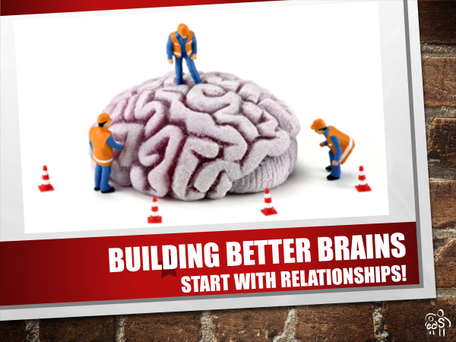How Playing with your Children Strengthens your Relationships – and Why That Is So Important2/23/2021
1. Play connecting games with each of your children. Connecting games are those you play just to focus on your relationship with your child. You are playing a connecting game when: you feel loving toward your child, you are in close contact (using eye contact and touch when possible), and you are being playful. These activities can be brief but are extremely powerful in strengthening the bond between you and your child, which is important for children of every age. 2. Dedicate a special time to play with each of your children individually. Schedule about 15-20 minutes when you will play with your child one-on-one, allowing him or her to be in charge. Keep rules to a bare minimum and don’t try to lead their play or teach them anything. Just be emotionally present and give him or her your full attention. (Yes, this means turning off your cellphone!) Give this special playtime a name and commit to offer it consistently for each child, whether it is every day or every week. You and the child will feel closer and you will get to know your child’s interests and abilities even better! 3. Interact in ways that support your relationship. Use these relationship-building ways of interacting with your children throughout your day, when you are playing and any time you are together. They not only strengthen your relationships with them, they also set the stage for more beneficial play times between you.
These times are opportunities to engage in “serve and return” interactions. These brain-building back-and-forth interactions are like a game of tennis: Your child “serves” by looking, pointing, or talking, then you return the serve by responding to the focus of their attention. Take as many turns as you can, noticing serves, encouraging and talking about his or her interests, waiting for responses and realizing when they are ready to stop. Serve and return interactions with shared attention are an extremely powerful way to build brains! Develop rituals to foster closeness. Rituals are consistent routines that you create with each child’s needs in mind. They are designed to strengthen relationships and provide predictability and comfort to your children. If you’ve developed a way of helping your children get ready for bed based on their needs and interests that is the same every night, you have a bedtime ritual. Think of other times during your daily routine that you can build in rituals and get your children’s help in choosing activities to strengthen your relationship: getting ready in the morning, saying hello and goodbye, during rides in the car or bus, or waiting. Rituals build relationships and have the added benefit of helping make mundane routines more enjoyable times for all of you! Think positive. What you focus on is what you get! To get the most brain-building benefit out of your interactions with your children, focus on what you want them to do, not what you don’t want. When children are seeking your attention, they are really looking for relationship. This is a basic human need we never outgrow; our brains are wired for connection with others. When children are engaging in behaviors that “push our buttons”, try to think positive thoughts. Take time to observe them and listen to them, notice the good things they do, and offer encouragement as often as you can. When you think positive, your connection with your children will grow – and so will your joy in life!
Now that you know how important your relationships with your children are and have some playful ways to strengthen them, you are ready to have some fun. Enjoy growing closer with your children through play, and know you are building their brains and giving their learning, behavior and health a great start in life! Sources: Center on the Developing Child at Harvard University. (n.d.) Serve and return. https://developingchild.harvard.edu/science/key-concepts/serve-and-return/ Bailey, B. A. (2001). Easy to love, difficult to discipline: The 7 basic skills for turning conflict into cooperation. New York: Harper-Collins Publishers Inc. Head Start Early Childhood Learning & Knowledge Center Archive. (n.d.). The importance of teacher-child relationships in Head Start. https://eclkc.ohs.acf.hhs.gov/archive/policy/im/acf-im-hs-08-21-attachment Forrester, M. M. & Albrecht, K. M. (2014). Social emotional tools for life: An early childhood teacher’s guide to supporting strong emotional foundations and successful social relationships. Houston: Innovations in ECE Press Sources of Connecting Games
Bailey, B. A. (2000). I love you rituals. New York: HarperCollins Publishers, Inc Torbert, M. & Schneider, L.B. (1993). Follow me too: A handbook of movement activities for three- to five-year-olds. Washington, DC: NAEYC. Pierce County Library (n.d.) Wiggles, tickles & rhymes. https://www.piercecountylibrary.org/files/library/wigglesticklesall.pdf
1 Comment
9/22/2021 09:57:02 pm
Thanks for pointing out that children who have a consistent relationship with their parents have stronger self-regulation skills. This is really helpful since my husband and I have a strong bond with our only son. We are also hoping to find a child care center on Monday since we will be getting busy at work for two months.
Reply
Your comment will be posted after it is approved.
Leave a Reply. |
AuthorI'm Diane Goyette, a Child Development Specialist, Trainer, Consultant and Keynote Speaker. I'm excited to share my blog! Archives
August 2023
Categories
All
|
|
Ways to Contact Us:
Schedule an Appointment |
|
Follow earlychildhoodspecialties for encouragement, teaching tips and more!
|
Follow eepworm for child-friendly posts!
|
© 2013-2024 Early Childhood Specialties LLC. All rights reserved.





 RSS Feed
RSS Feed